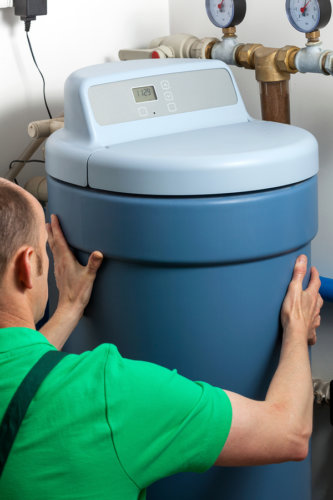Hard water is a problem that many homeowners face. It can lead to major repercussions around the home, including spots on dishes, plumbing problems and even ineffective appliances. If you want to keep your appliances in good shape, it is pertinent to solve this problem immediately with a good water softener. Purchasing a water softener will be far more difficult than you could ever imagine. Within this guide, you will discover a breakdown of questions that need to be asked, before a purchase is made.

What Is The Grain Capacity?
When taking a look at any water softener, you will see that it has a number of specifications. One will be the grain capacity. This is likely the most important factor of all, since it tells you exactly how many grains of hard water the unit is capable of removing. If you happen to have significant hardness, you’ll need a water softener with a higher capacity and vice versa.
How Is Hardness Actually Measured?
In order to gain a better understanding of the water software, it is a good idea to figure out precisely how the water’s hardness is measured. In general, this figure is calculated in GPG or grains per gallon. A single grain of hardness will equate to 1/7,000 pound of rock. Depending on where you live and your water distributor, there is a possibility that the figure will be displayed in milligrams, parts, or liters.
What Is The Water Softener’s Regeneration Period?
All water softeners will go through a regeneration period. During this time, the softener will not be able to soften the water and instead will need to regenerate itself. When this happens, the water softener will use the salt in the tank to remove the hardness particles. Once this process has been completed, the water softener will be able to start making soft water once again.
What Types Of Water Softeners Are Available?
It should be known that there is an abundance of different water softeners available on the market. Most will want something that is easy to install, long-lasting and cost-effective. Of course, it is not always essential to install the device directly on your water line. There are some faucets and shower heads that double as water softeners. While these will not provide a whole-house solution, they will solve the problem in one specific area. Also, there are water softener chemical solutions that can be added directly to the water.
With this in mind, you will need to determine right away which solution is best for you.

How Much Should I Expect To Spend?
When it comes down to it, the prices placed on water softeners vary substantially. Nevertheless, they’ll prove to be well worth it. They’re far cheaper than household appliances, which could be damaged severely by hard water. At the same time, the electricity required to power a water softener is minimal. These devices require electricity that is equivalent to an alarm clock’s needs. So, the long-term costs are low.



It’s great to know more about water softeners. We’re hoping to get one for our home because we’ve got crazy hard water right now. I didn’t realize that there were different options and installation options. We’ll have to do that research before making a decision.